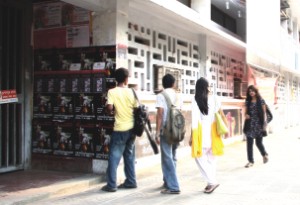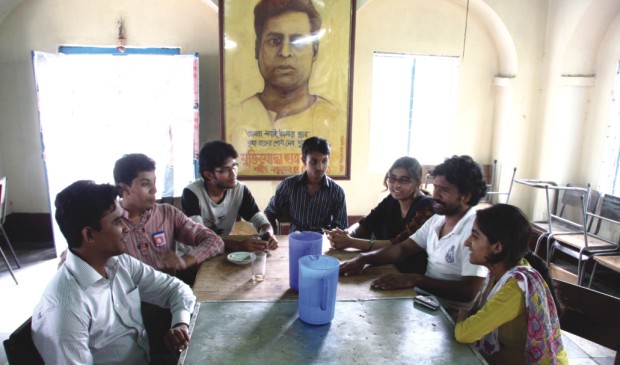| Home - Back Issues - The Team - Contact Us |
 |
| Volume 10 |Issue 19 | May 20, 2011 | |
|
|
One Off What's so Despicable About Politics? Aly Zaker
Having gone through secondary school and college that had no room for politics I was wary of even having a political opinion when I entered the Dhaka University. I thought, as a routine, I would finish my university education and someday land a job. Had my father been alive I would have had no option but to sit for the Central Superior Service Examination of Pakistan to follow in his footsteps of becoming a bureaucrat. But he had decided to leave us when I was in my second year of intermediate. That did two things to me. One, it absolved me of becoming a bureaucrat and two, made me aware of the fact that I had to fend for myself monetarily soon after coming out of the university. However, as was usual in those days, I was approached by a number of student political parties to join them. One of them took me to a leader of theirs who told me that “Politics is nothing but being conscious of and vocal about your basic rights as a human being.” This I took to heart and decided to join left-leaning student politics, albeit, not so actively. These days I often find that the young people in their interviews or on the facebook proudly proclaim that they 'hate' politics. Little do they realise that when they say that they hate politics, they become political. This means they are not uninterested or apathetic to politics but are anti-politics and that “I hate politics” is also a political statement. A young woman, again in facebook, commented the other day about the heated arguments we often see amongst opposing politicians as 'uncivilised'. I had sarcastically reminded her that the benches in the house of commons of the British Parliament were riveted to the floor not without a reason! There was a time when members of the British Parliament used to throw these benches at each other. Obviously the young woman could not read the persiflage in my comment. It is the principle of politics to generate heat. It should be the principle of the politicians to keep the heat under control. The more civilised we get, the more reticent the politicians will be and more refined politics will become. But no civilised society can be devoid of politics. A society or a country without politics is barbaric to say the least. A free-for-all pandemonium leading to rule through the language of weapon will take over in such a society. I hope our younger people appreciate this. Indeed, I firmly believe that it is for the young and the enlightened with a mass contact to take over from the politicians of the yesteryears. A few things they should, however, constantly bear in mind. They must not lose sight of the birth-pangs this beloved nation of ours underwent and the history in its right perspective. They must know the common people of the country, their values and aspirations and, more importantly, their pains and tribulations. Unfortunately in our society expediency of all forms seem to have become a norm. We want to conveniently forget all values and ideals and take recourse to inappropriate and short sighted conducts. While negating politics on account of the fault of the politicians, they must not forget that the older politicians of this country had, more often than not, their acts together and facts right. Or else it would not have been possible to free Bangladesh starting with the language movement in 1952 and coursing the country to freedom in 1971.
This, of course, is not true of all politicians of the present time. Some of them have bought their way into politics and subsequently in the position of power by the sheer strength of money. But the model of politics as was seen in our part of the world was one of a passion, a passion for doing something for the people at large. Bangabandhu Sheikh Mujibur Rahman, Sher-e-Bangla A K Fazlul Haq, Maulana Abdul Hamid Khan Bhashani, or their predecessors and compatriots like Deshbandhu Chittaranjan Das, Netaji Subhash Chandra Bose, Bidhan Chandra Roy, and the Late Jyoti Basu et al. had the same motive behind choosing politics as their full time vocation. It is indeed necessary for today's politicians, whether in power or out of it, to think of the country and its people and coax the younger generation to eventually assume the position of leadership when the time comes. Unfortunately they are not doing that. The politicians of today indulge in flagrant abuse of the ground rules and practices by doing things that are not proper for a politician. This does not set a positive image of either politics or the politicians. And that induces the currently held image of disdain amongst the young people of today. The most commonly practised syndrome is to go to their constituencies, make tall promises, often sell their parental connections or hard earned reputation, get elected, come back and conveniently forget their voters or the promises they made to them. They settle for a cushy life that the city provides them. This has become the general trend with those that came to be politicians today. And such are the people who earn the wrath of the younger generation. The leadership in the political parties, who are genuine politicians, must bear this in mind because politics cannot end with the end of their political life. Politics is a process and must go on. Therefore, it is imperative that those who are in leadership today must create genuine political successors. They will not indulge in politics for mere worldly gain. They must be transparent and they must go to the people who have installed them in the citadel of power. We know that as a matter of policy and with genuine reasons the party leaders take decisions that would bring long term benefits to the people and the country. This effort is often lost because of the self-serving deeds of the second tier leadership under them. As a matter of policy every well meaning political party must make it obligatory for its representatives to maintain a continuous relationship with their constituencies, explain the ground realities relating to various issues, must be answerable for their behaviour and, above all, respect the democratic norms. These have been blatantly flouted often in the past resulting in coming to power of the dictators and their lackeys, thereby threatening the society and its people. Politics, after all, is not despicable provided the politicians have their act together and the younger generation look at it with an interest. They owe it to the land that has nurtured them to their adulthood.
Copyright
(R) thedailystar.net 2011 |
||

